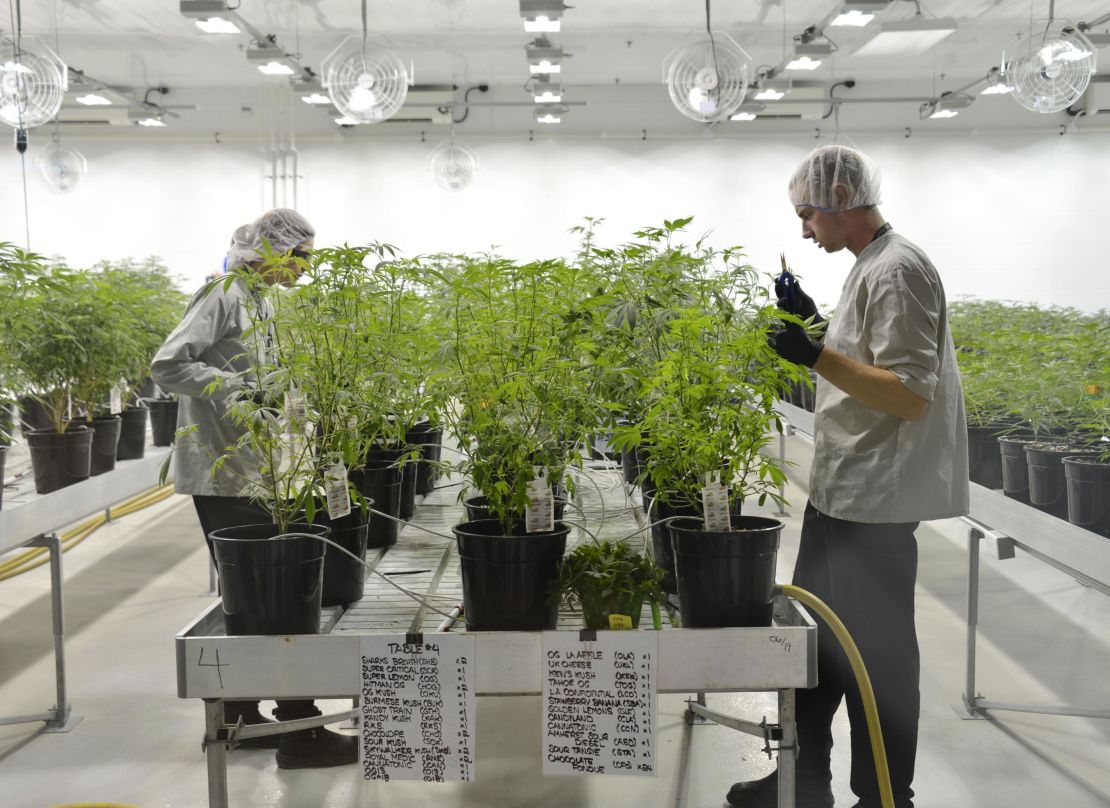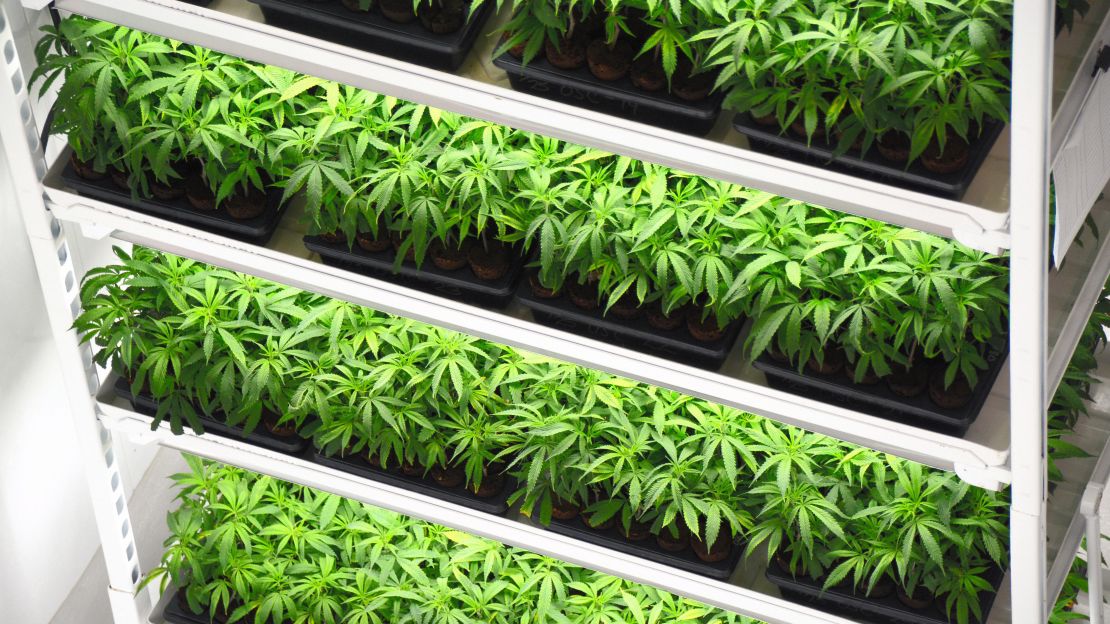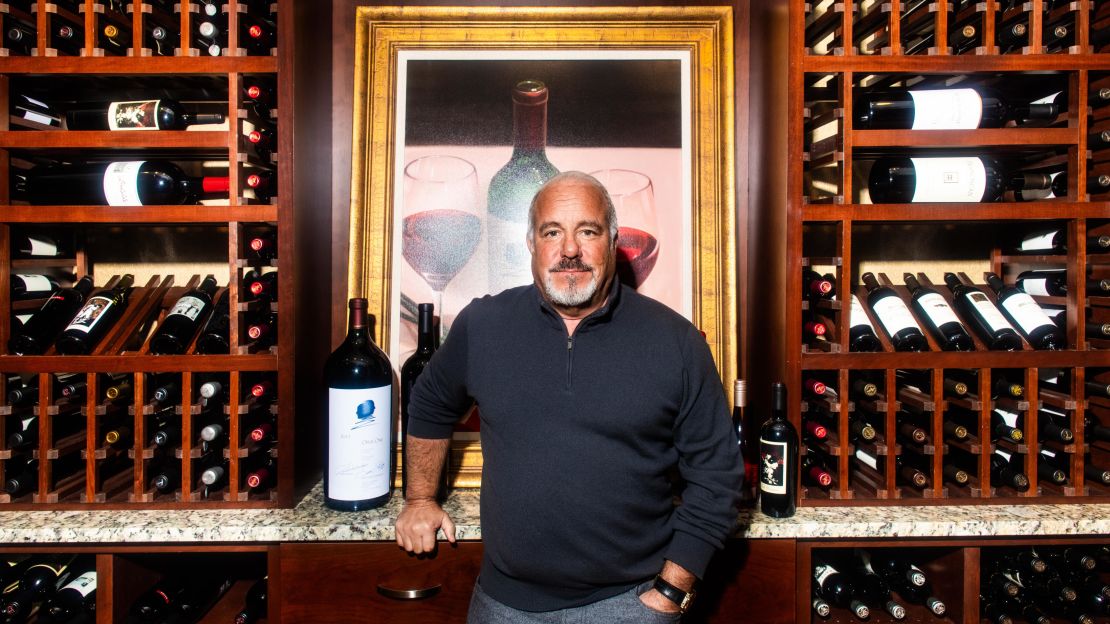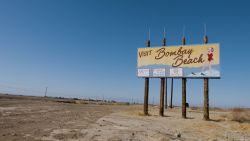Risk Takers 2019: Sometimes a risk works. Sometimes it fails. Sometimes it takes years before you know. See who else made the list.

Constellation Brands, a major American beverage company, had been weighing whether to break into the cannabis business for a while when executive chair Rob Sands had an epiphany.
While marijuana legalization was moving slowly in the United States, it would soon be legal in Canada — a sizable market. Sands saw clearly that it was time to make a move.
“That was really the genesis of what got us thinking about it,” Sands, 60, told CNN Business.
In October 2017, Constellation Brands, which makes Corona and Modelo beer, Svedka vodka, Casa Noble tequila and more, paid $245 million (Canadian), about $183 million (US), for a small stake in a Canadian cannabis company called Canopy Growth.
Bill Newlands, Constellation’s president and CEO, was nervous on the morning of the announcement. We “all sat around the table and just said, we have no idea how the market is going to react,” Newlands told CNN Business. “There’s a certain level of risk attached to that question when you don’t know the answer.”
That first morning of trading was a “hold your breath moment,” said Newlands, who replaced Sands as CEO on March 1, when Sands, who had led Constellation since 2007, took the executive chair position.

Shares of Constellation ticked up slightly, and then rose nearly 3% the following day. The strategy behind the investment in cannabis may have been obvious to Sands, but it took the industry largely by surprise.
“That was the last thing I was thinking I would read,” Tim Ramey, a food and beverage analyst with Pivotal Research Group, recalled. “To me the cannabis industry was a bunch of corner head shops,” he said, rather than a scalable, strategic investment. At the time, Constellation was the only major beverage business thinking seriously about cannabis.
Sands wasn’t finished. In August 2018, Constellation Brands said it would increase its ownership to about 38% and pour another $4 billion US into Canopy. The terms of the deal allow Constellation to take up to a 55% stake — something Sands thinks it will do, calling a still larger investment a “no brainer.”
More from Risk Takers 2019
The hefty sum has already spooked investors.
In January, Constellation slashed its 2019 forecast because of additional expenses from the deal and expected weakness in its wine business. Shares of the company plummeted.
That report shows just how much Constellation has on its plate. Not only is the company breaking ground in the cannabis sector, but it also has to keep up with evolving consumer tastes in alcohol, its core business.
It’s not an easy feat. But Sands isn’t shying away from the challenge.
An ‘aggressive entrepreneur’
In many ways, Cannabis is an enticing new market for beverage companies. Consumers are increasingly looking for drinks that give them something extra: A jolt of caffeine, a nutritional boost or, in theory, a cannabis buzz.
But Cannabis’ questionable legal status has scared off many big companies.
“Other alcohol companies were saying no, or turning down opportunities to even meet with us in any meaningful way,” Bruce Linton, founder and co-CEO of Canopy Growth, told CNN Business.
Linton reached out to Constellation Brands (STZ) after he saw that Sands had said publicly that cannabis could be a good move for the company. He sent a LinkedIn message to a member of Constellation’s business development team in 2016. Less than a year later, the deal was announced.

Sands is an “aggressive entrepreneur,” Linton noted. “He interacts with a purpose.” Linton said he gets emails from Sands at 1:30 in the morning, and that they have quick, decisive conversations. “When you talk to him, it’s three minutes and you get it done.”
The decision to invest in Canopy “was vintage Rob Sands,” said Bob Duffy, president and CEO of the Greater Rochester Chamber of Commerce, where Sands serves as chairman of the board. “It’s a gutsy, courageous, bold decision.”
Sands “has the courage to lead and take action, and he does it without any hesitation,” Duffy said.
Sands likes to play devil’s advocate, Newlands said, to make sure big decisions have been fully considered. Often, Sands will argue against his own opinion. “He’d much rather have a long debate around a topic,” than make a quick call and rethink it later, Newlands noted. The “beauty of that is that it allows us to make, in some instances, fairly bold decisions.”
‘It’s a bold move. Is it a risky move?’
Congress voted to legalize hemp in the United States late last year as part of the 2018 farm bill, months after Constellation upped its stake in Canopy. Hemp is high in cannabidiol, or CBD, a non-psychoactive compound which some say helps reduce anxiety and stress, and low in THC, which gets you high.
Before the farm bill passed, the DEA had said that it wouldn’t go after businesses and consumers over hemp or CBD. But companies that tried to sell CBD drinks nationally ran into problems. Dirty Lemon, a startup that sells beverages over text, pulled its CBD drink after trucking companies refused to ship the products and insurance carriers refused to work with Dirty Lemon because of the CBD beverages.
The farm bill should make laws around selling CBD products easier. But marijuana is still illegal on the federal level, and it’s not clear when, or if, that will change.

Sands isn’t bothered by any of that. “You don’t have to read the tea leaves very closely to understand that it’s being legalized in one form or another pretty much all around the world on a rapid basis,” he said. For Constellation, “it’s going to be a multi-billion dollar business.”
“It’s a bold move,” he said. “Is it a risky move? I’d say probably not as risky as it seems from the outside.”
Sands’ cannabis pitch is clear and convincing. In the Constellation Brands’ Victor, New York office, on a frosty day in December, he laid out the reasoning in a straightforward, methodical way.
Constellation Brands is “all about entertainment and making life enjoyable,” he said. People who drink beer and wine may also want to try a nonalcoholic cannabis beverage, or eat a cannabis-infused snack. With the legalization of cannabis in Canada, Constellation has a guaranteed market. Even if the US government drags its feet, Constellation can start selling cannabis products in Canada.
“Just based on Canada alone, our investment’s really going to be good,” Sands explained. Anything else is “gravy.”
Cannabis is ‘a huge global opportunity’
Newlands is all-in on the investment. “We put ourselves in a position to be the leader in a once-in-a-lifetime growth opportunity,” he said. Cannabis will “be an important part of our success story in the future.”
Sands sees the Canopy investment as comparable to other mergers and acquisitions that have helped Constellation Brands grow. “Constellation is a very entrepreneurial company,” he said. And “entrepreneurship is not gambling — It’s taking very calculated risks.”
At first, Sands saw the partnership with Canopy as allowing Constellation to make non-alcoholic cannabis beverages. But after a second epiphany, he started to think bigger.
“We shouldn’t be restricting ourselves to either just beverages or any particular market” like Canada, he said. Cannabis is “a huge global opportunity.”

Sands has a grand vision for the partnership. Through Canopy, Constellation will enter into medical cannabis, edibles — every cannabis channel, in every market where it’s legal.
“Canopy is Constellation’s arm for participation in the cannabis sector,” he explained.
Sands plan has convinced some analysts.
Ramey wrote in October that Constellation Brands is on “an upward trajectory,” adding that “the core business is growing faster than anyone believed, and the Canopy Growth investment is very likely a masterstroke.” Ramey has a personal investment in Canopy Growth.
Vivien Azer, an analyst who covers the beverage and cannabis sectors for Cowen, wrote in a December note that she expects Constellation’s “first mover advantage in cannabis to pay dividends as the industry continues to gain momentum and more traditional CPG companies look to enter the space.”
A boon for investors
Thanks in large part to Sands leadership, what seemed unthinkable in October 2017 is becoming the norm.
Molson Coors Canada announced a joint venture with The Hydropothecary Corporation, a Canadian cannabis company, in August of last year.
Marlboro-owner Altria announced in December that it is investing $1.8 billion in Canadian cannabis company Cronos Group. Soon after AB InBev, the world’s biggest brewer, announced that it is teaming up with Canada’s Tilray to research cannabis-infused drinks.
Cannabis may be a good bet, but it’s not yet a sure thing. Consumers may always have a taste for cannabis, Ramey noted, but a long path to legalization could be a problem.
The question is, “did they miscalculate how quickly the development of the market could occur,” he said.
There’s also a risk to Constellation’s stock price in the short term, Ramey said. Shares of Canopy Growth swung wildly when recreational cannabis became legal in Canada, a case of investors buying the rumor and selling the news. That volatility could drag down Constellation Brand’s stock, Ramey noted. But if Canopy shares soar, they could lift Constellation’s stock as well.
Sands sees the investment as a boon to Constellation’s shareholders. “They’re getting the cannabis business for free,” he said.
— CNN Business’ Paul R. La Monica contributed to this report.
More from Risk Takers 2019: Mary Barra’s impatience could save GM. ‘Time is not our friend’



















